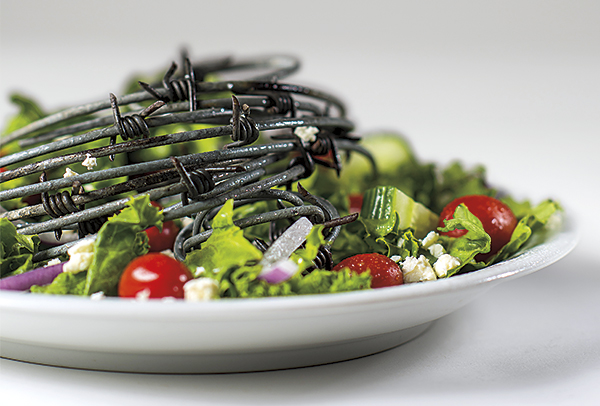For people living with a recurrent C. difficile infection, everyday mealtime becomes a painful test. Patients can't properly digest food, and the joy of eating becomes suffering as each meal tears its way through the intestines. U of A researchers are finding that an ancient solution - fecal transplants - is giving patients back their lives when other treatments have failed.
After four months of gastrointestinal hell, Susan Brothen cried with relief when she was finally able to eat a tomato, lettuce and mayo sandwich.
In spring 2014, Brothen suffered from a recurring bacterial infection that left her with endless bouts of diarrhea, fevers and abdominal pain. On her worst days, she would go to the bathroom up to 13 times; good days meant five or six trips. For four months she was scared to leave the house because she had no control over her bodily functions. She lived on mushed salmon mixed with a bit of rice.
"Every time I ate I would be in the bathroom within a half-hour," says Brothen. "My body wasn't getting any nutrition, I had no energy and I lost 30 pounds. I had no appetite and I would gag on my food. All I thought about was food and the bathroom. It was affecting everything in my life."
She eventually learned the culprit was a recurrent clostridium difficile infection, also known as RCDI, a bacterial infection that developed when she used antibiotics to treat a blocked salivary gland.
Getting sick from antibiotics? It's possible because antibiotics disrupt the normal populations of gut microflora, making the environment friendlier for nasty bacteria such as C. difficile. It grows quickly and produces toxins that cause illness. In the competition for limited resources in the gut, sometimes the bad guys win.
Typically, people with C. difficile infections are prescribed another antibiotic. But for the unlucky patients who develop a recurring infection, symptoms return within days of stopping treatment. Some end up on a seemingly endless cycle of illness and antibiotics long after the original illness is gone. Recurrent C. difficile deprives patients of the ability to live normal lives and costs the health-care system millions annually.
Patients have traditionally undergone treatments that are more invasive and prone to side-effects, such as surgery or repeated rounds of antibiotics. Recently, a different method is gaining popularity: fecal microbial transplant. It's literally transplanting healthy donor feces into a patient's gut to replenish normal bacteria levels and ensure the intestines are healthy and working as they should. Relief comes almost immediately for those who undergo a fecal transplant, says one of two people performing the procedure in Alberta.
"Patients often feel better the next day. It's amazing," says Dina Kao, '94 BSc(Spec), '99 MD, '08 MSc, associate professor and a gastroenterologist at the University of Alberta Hospital. "This is the most rewarding work I have ever done."
Kao has performed fecal microbial transplants as what is termed investigational therapy since 2012, and has successfully treated more than 140 people with recurrent C. difficile. According to Kao, the procedure could save the provincial health-care system at least $10,000 per patient. Clinical trials are also underway to use the procedure to treat inflammatory bowel disease and hepatic encephalopathy, which is the loss of brain function brought on by liver disorders.
Most patients choose a colonoscopy as the delivery method for the fecal transplant. Other options include an enema, a feeding tube or an oral treatment that involves taking 40 pills in an hour. Patients who need more than one transplant can usually have another done two to 14 days after the first. As for donor feces, every precaution is taken to ensure a healthy sample is harvested. Most of the donors are nurses, tested to ensure excellent overall health and safe specimens. The prepared fecal suspensions are stored as fresh and frozen fluid; the use of one or the other depends on availability.
Before and after the procedure, Kao closely monitors the patient's gut bacteria. Within days or even hours of a transplant, the mix of bacteria changes radically, returning quickly to a healthy combination predominantly of Bacteroidetes and Firmicutes, bacteria essential in a healthy human gut. "It's like having two arms and two legs - the combination of these bacteria are normal for us," says Kao.
Brothen started to feel better immediately after her fecal transplant, and by the next day was able to leave behind her salmon-and-rice diet. "That sandwich tasted so good," she says. "I hadn't eaten greens in four months."
The future of fecal transplants is one of hope and continued research. "There is so much we don't know about fecal transplants," says Kao. "Health Canada considers it investigational therapy and recently they have said they want to put in some regulations to ensure the safety of patients. There will probably be some regulation changes in the future, but we don't yet know what those look like."
Brothen hopes the treatment helps as many people as possible. "If someone told me that I would have a fecal transplant, I would have said they were nuts," she says. "But when you're sick you will do anything to get better. Dr. Kao gave me my quality of life back."

We at New Trail welcome your comments. Robust debate and criticism are encouraged, provided it is respectful. We reserve the right to reject comments, images or links that attack ethnicity, nationality, religion, gender or sexual orientation; that include offensive language, threats, spam; are fraudulent or defamatory; infringe on copyright or trademarks; and that just generally aren’t very nice. Discussion is monitored and violation of these guidelines will result in comments being disabled.